Affiliate disclosure: This post may contain affiliate links. Please see our Privacy Policy.
Having clean, potable water in an emergency can mean the difference between life and death. While you can survive for weeks without food, your body will start to break down in just days without water. (Or just hours in a hot climate.)
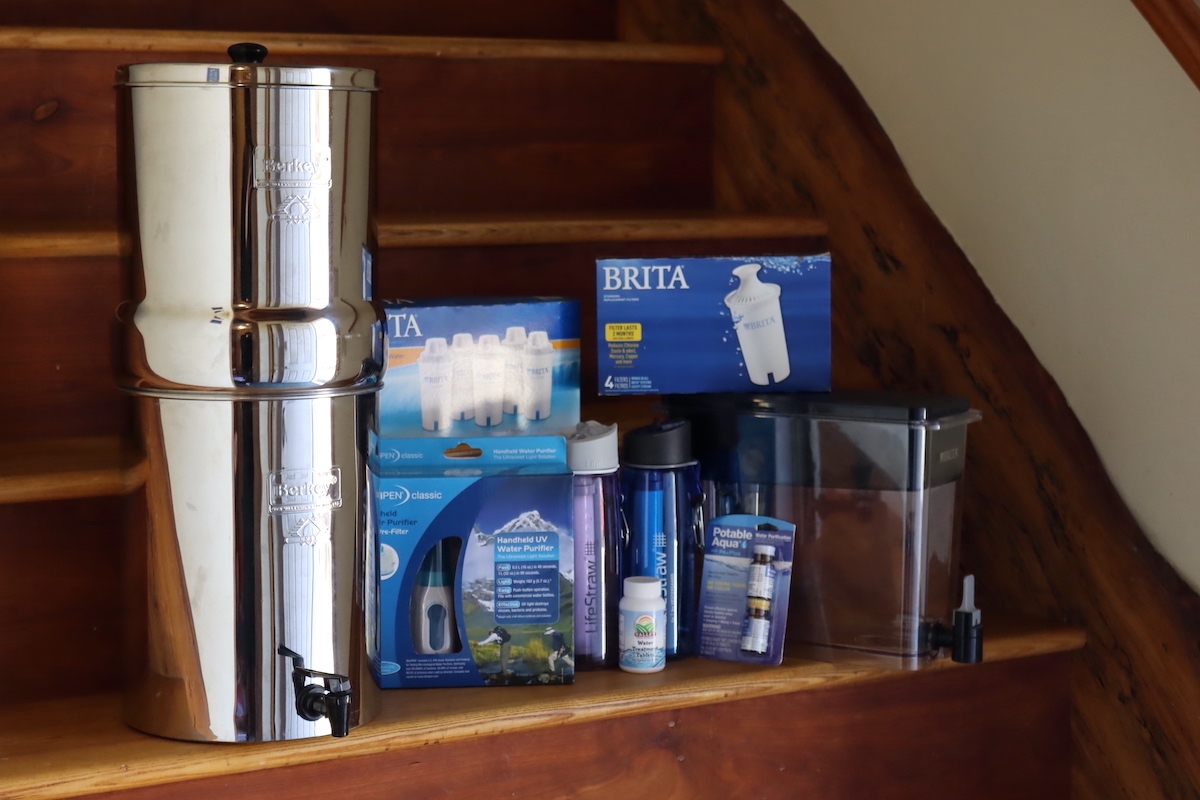
These days, most of us living in developed countries take water for granted. Potable water just comes out of the tap on demand, with no need for filtration or purification.
Just one trip south of the border to Mexico, where you have to brush your teeth with bottled water, and you learn just what luxury clean potable water really is.
Still, even there, you’ll have access to running water on demand.
What about water in an emergency? What do you do if you don’t have access to basic services, either due to an emergency like an earthquake or tornado?
Even short of a major emergency, city folks are all familiar with boil water notices due to contamination, and rural folks know that your well pump just won’t work when the power’s out.
There are plenty of times everyday emergencies far short of the actual apocalypse where you just need a way to process water to make it clean and potable. Or, you need to access your water stores because there’s just no other water available.
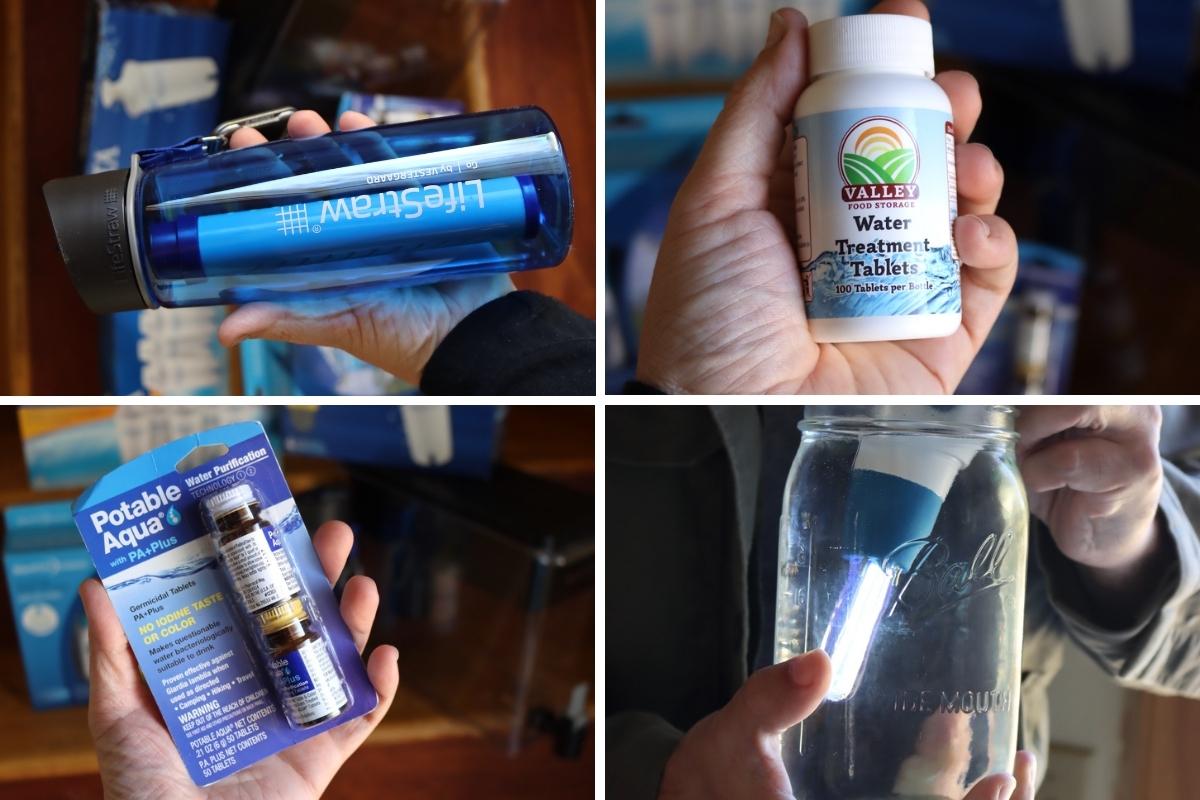
Best Emergency Water Filtration & Purification Options
I’ll take you through all the options available for emergency water filtration and storage and let you choose the right option for your family and circumstances.
If you’re in a hurry, these are the very best options, in my opinion.
- Best At-Home Water Filter: Berkey Water Filters (Filters & Purifies) or AlexaPure Filters (Backup Option)
- Best Drinking Water Filter for Hiking: Lifestraw Filter Bottle
- Best Portable Water Filter for Groups: Life Straw Gravity Filter
- Best For Dependable Water Purification (without filtration): Potable Aqua Plus with Neutralizer Tabs
- Best For Chemical Free Water Purification (without filtration): UV Purification Wand
(2024 Water Filter Update: Berkey is having supply chain problems, and they’re not readily available. Occasionally, they’re available through Pleasant Hill Grain and a few other suppliers, but not dependably. Consider an Alexapure Filter as an alternative, as they’re similar, and much more readily available these days.)
Emergency Water Filtration & Purification
Let’s start with the assumption that water is readily available, and it’s just not clean or potable. That could be in a city, where there’s still water coming from the tap, but it’s contaminated for some reason. (We’ll cover water storage later.)
It also could happen if you’re in a water-rich area of the country like we are here in Vermont, there are streams and rivers just about everywhere, and it rains every couple of days all year round.
Even when the water’s not available at the tap, there’s plenty of water to be had…provided you can make it clean and safe to drink.
There are two main types of water treatment: filtration and purification.
Filtration will remove dirt, debris, and other particles from water sources. Think cloudy lake water or rainwater running down your dusty gutter pipes.
Some really advanced filtration systems will also remove biological contaminants, like bacteria that can make us sick.
On the other hand, water purification takes visibly clear water from a clean mountain stream and kills any potentially harmful bacteria. It’ll also kill off anything that’s living in stored water sources.
Emergency Water Filtration Options
Not every type of water filter is rated for emergency use.
Small charcoal filters like in a home Britta pitcher are not sufficient to actually count as emergency water filtration. They improve the taste of water, but they can’t make questionable water safe to drink. (I do not recommend using Britta or simple charcoal type filters for emergency water filtration, they’re just not effective at removing contaminants from water.)
Some of the best emergency water filtration options include:
Berkey Water Filters
They’re a great option for at home, and we use one every day. If our well power goes out, I know I’ve always got several gallons of clean, potable water waiting in my Berkey water filter. We could use it to filter rainwater or stream water in an extended emergency.
Berkeys not only remove physical contamination like dirt, minerals, and heavy metals, but they also remove pathogenic bacteria from your water.
The filters inside a Berkey are so fine that they removed 100% of pathogenic bacteria in trials, so they’re approved to filter almost any water source. Not just tap water in a boil water notice, but also rainwater or stream/pond water in an emergency.
Generally, we’re just taking water from our well and running it through as an extra line of protection (in non-emergency circumstances). It’s good to know that we could actually use it to filter water from our pond in a real emergency, like if we were cut off after a natural disaster.
There are a number of similar brands, just without the Berkey name, and they’re considerably less expensive. Alexapure Water Filters are a good example, and very similar in terms of capacity and filtration ability (just a bit less expensive).
There are pros and cons to these types of filters, regardless of brand:
Pros
- Long-Lasting ~ Rated to filter 4 to 5 gallons per day for 2 to 5 years before replacement (depending on how dirty the water is). That’s somewhere between 3,000 and 9,000 gallons of water between filter replacements.
- Good Value ~ They may be more expensive than some of the other options, but they are rated to last a long time and filter literally thousands of gallons. They’re actually some of the least expensive options at a per-gallon price rate.
- Great for Extended Emergencies ~ They’ll work and keep working through extended emergencies, even if you need to filter your water for weeks at a time.
- Cooking & Washing Water ~ Personal water filters like the Lifestraw only work for drinking water, not for filtering water to cook (it’s literally a straw). This filters water and allows you to decide what to do with it, even if it’s just the flexibility to allow you to brush your teeth without the risk of bacterial contamination.
Cons
- Expensive ~ They’re rated to filter a lot more water than the other options, but they also require more upfront investment.
- Not Portable ~ These are designed for home use, and they’re not good as portable options. They do have some smaller travel models, but travel means like in a hotel room…not camping.
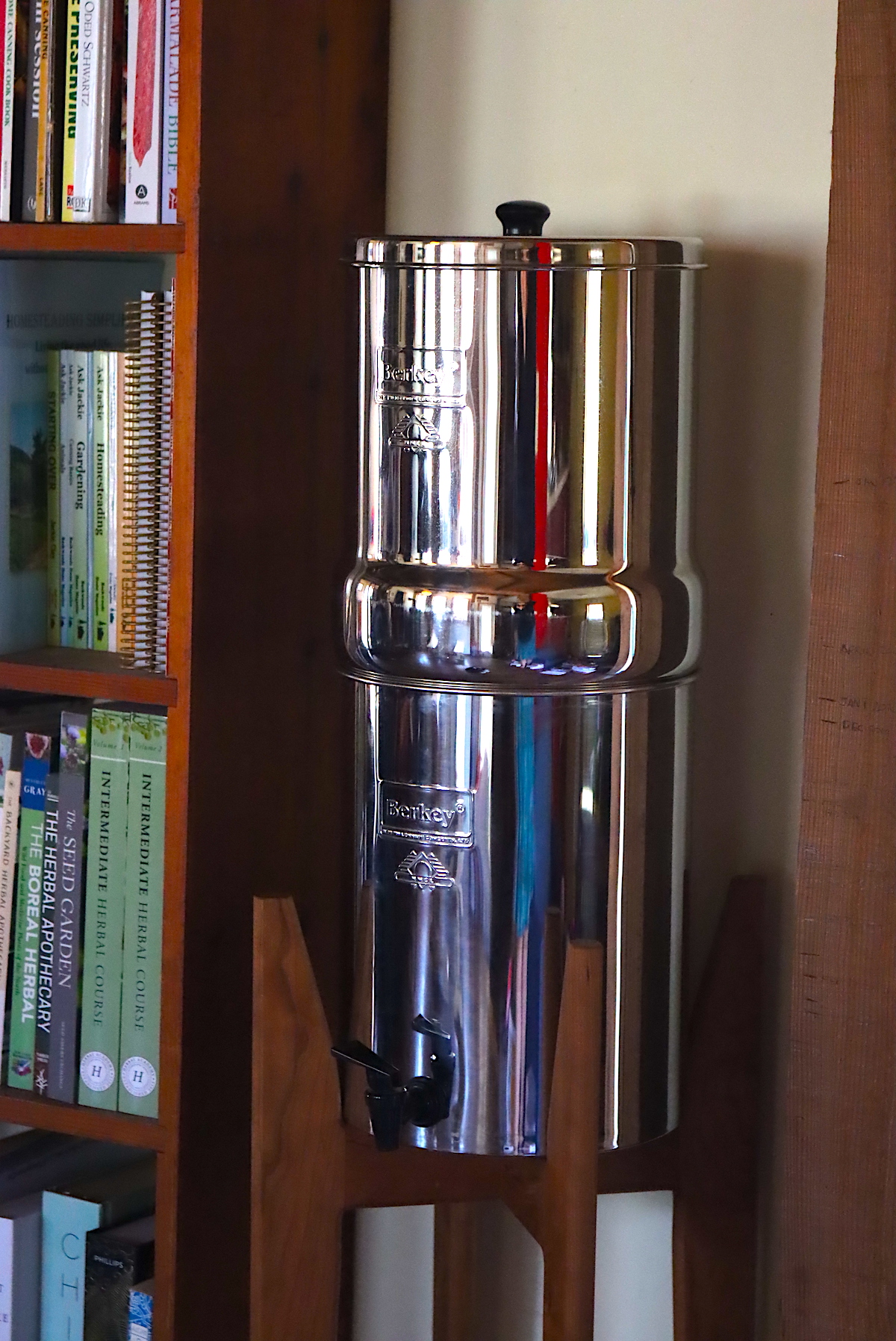
Lifestraw Water Filters
A good option for portable water filtration, a life straw will allow you to drink directly from a running stream. The filters inside the straw remove physical contamination like dirt and micro contamination like bacteria.
Originally they were just small portable straws for hikers and campers, but now they have a number of options.
- Life Straw Original ~ Their original model is designed for portability and single-person use. While inexpensive, they’re actually long-lasting. An individual life straw is rated to filter around 40 gallons of water, or about 2 months’ worth of drinking water while hiking.
- Lifestraw Filter Bottle ~ Similar to the original life straw, but it’s filtering water out of an attached bottle. Fill the bottle, then suck the water through the straw (rather than right out of a stream). It’ll allow you to transport your water too.
- Life Straw Gravity Filter ~ A portable water sack that you fill and allow to filter through into your own container slowly, and it all collapses down neatly for transport. It is slower than household models, but it can still filter 2 to 3 gallons per hour and is rated to filter just under 5,000 gallons before replacement.
- Life Straw Community Water Pitcher ~ A long-term community-scale water filter, this one is like the Berkey in many ways. Not as portable as the other life straw options, but it’ll hold 13 gallons of water at a time. It’s rated to filter enough water for up to 100 people for 3 to 5 years. (That’s quite the claim, hopefully, it lives up to the hype!)
Pros
- Portable ~ These allow you to filter water on the go; most are lightweight and/or collapsible.
Cons
- Just for Drinking on the Go ~ Most of the options require you to suck the water through a straw for filtration, so you can’t exactly filter it ahead of time. You also can’t use it for cooking, brushing your teeth or many other things. These are mostly designed to be lightweight filters for hiking.
- Not Ideal for Cooking & Washing ~ Their more expensive options allow you to filter water without drinking it, and they’re a good option for camping. The more durable Berkey filters are a better long-term option if you’re at home.
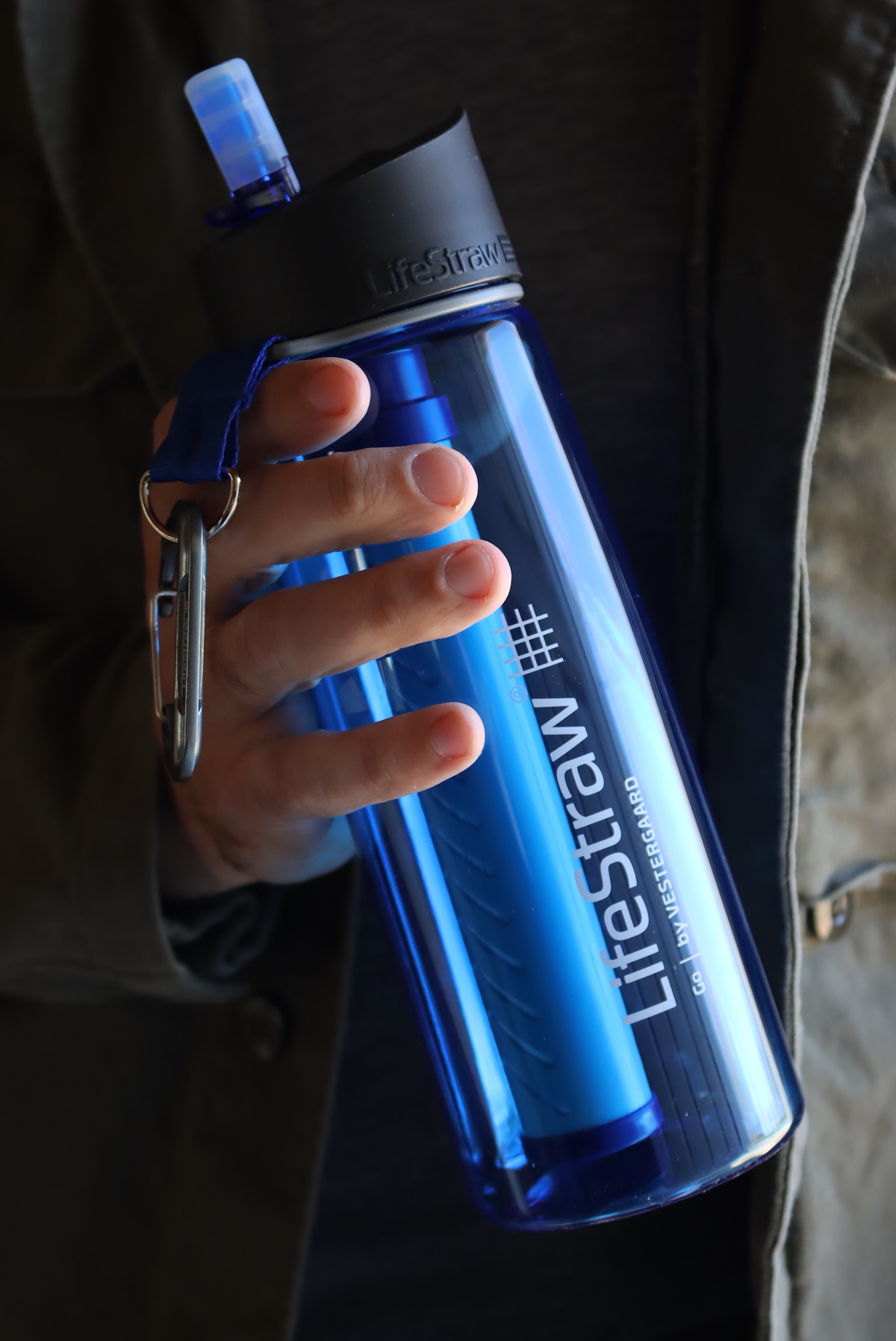
Water Purification
Sometimes you may find yourself in a situation where you have “clean” water that doesn’t necessarily need a filter, but it’s just not potable due to the potential for bacterial contamination.
That can happen at home during boil water notices, where the water is still clean and clear but you need to boil it (or purify it) before drinking.
For campers, that happens when you have plenty of water from a clear mountain stream, but you’re still worried about invisible bacteria that could make you sick.
Lastly, if you’re storing water for any length of time, it can start to grow contaminants. This happens when you store water in 50-gallon food-grade drums. Even if it was clean and potable when it went in, it’ll need to be purified (but not necessarily filtered) before use in an emergency. (We actually don’t store water in big 50-gallon drums, at least not for drinking. Canning water works better for us, and it stays clean and contaminant free.)
Keep in mind that Berkey Water Filters are actually both a filter and a purifier, as they’ve been tested to remove all types of biological contaminants (literally 100%, not just the 99.9% you see on most claims.)
UV Wand
One of the very best ways to purify water, is quick and doesn’t leave any chemical aftertaste. UV exposure naturally kills bacteria, and small portable UV wands are perfect for camping or home use. We have this one from SteriPen that we keep on hand for backpacking since I’m really not fond of iodine tabs.
Beyond purifying water completely without chemicals (or chemical tastes), these things work pretty fast. They’ll purify a liter of water in about 90 seconds, while most chemical methods require at least 30 minutes (and sometimes 4 to 24 hours).
Pros
- No Chemical Taste
- Quick Acting
- Easy to Use
Cons
- Requires Batteries
- Best for Purifying Small Containers of water at a time (1 to 2 quarts)
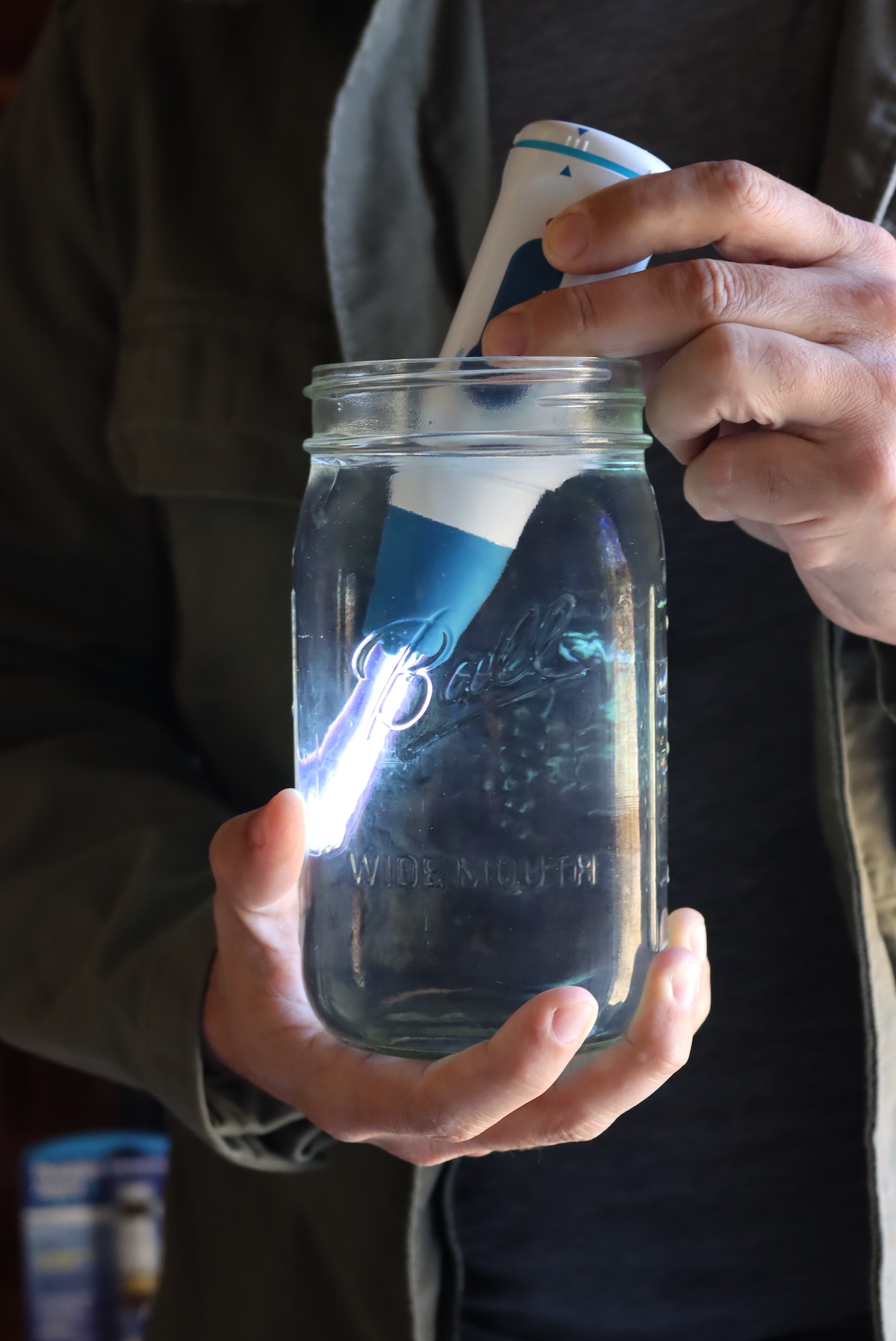
Iodine Tabs (or Potable Aqua Tabs)
Most campers and distance hikers are familiar with iodine tabs (or potable aqua tabs) for water purification, and they’re cheap and effective. You drop a tab into a bottle of water, usually scooped up from a clear stream, and it kills off any biological contaminants.
Originally, the iodine tabs used in the 80s and 90s left a nasty taste in the water, but the potable aqua tabs they use these days are much better in terms of taste. Not taste-free, but better than the old school iodine tab taste that was almost like a right of passage for hikers back in the day. I’d still recommend keeping a couple of Kool-Aid packets on hand to hide the taste if you have any picky eaters (or kids) that need to stay hydrated.
They actually sell them now in two packs that include “neutralizer tabs” that you add after the water is purified, to remove the taste.
They’re relatively inexpensive, and a great backup option to keep on hand (if something happens to your other purifier, you’ll be glad to have a small bottle of potable aqua tabs on hand).
Pros
- Simple to Use
- Fast Acting
- Effective
Cons
- Not Flavorless
- Best for small amounts of water (in your water bottle)
- Not great for cooking
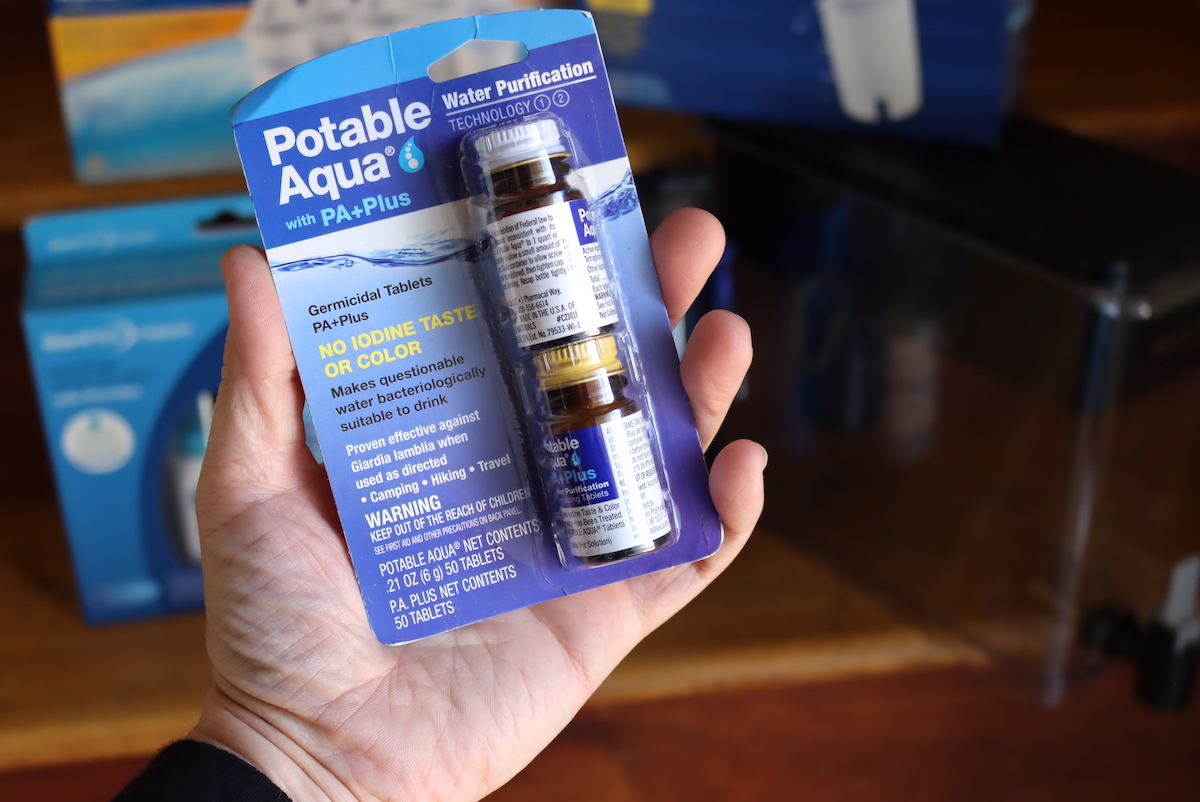
Chlorine Tabs
Another option, especially for home stored water, is chlorine water purification tablets. They’re not as instant as iodine, and you’ll need to add the recommended amount and then wait somewhere between 4 and 24 hours before drinking (or using to wash, cook, etc).
The chlorine will purify the water and then evaporate off into the air, meaning that the water won’t taste gross as it does when you use iodine.
You’ll need to be patient though! The water cannot be used until it’s sat open to the air for at least 24 hours.
That’s not exactly an option if you’re hiking, but at home, it’s not a big deal. Just sanitize tomorrow’s water today and you’ll be good to go.
For small quantities, you can get small tabs of chlorine dioxide that will each treat a quart of water.
For big batches, the tabs often come in a kit along with a 50-gallon storage drum.
Pros
- Easy to Use
- Inexpensive
- No Iodine Taste
- Great for all purposes (drinking, cooking, washing, etc)
- Can do big batches at once (ie. 50-gallon drum)
Cons
- Takes 24 Hours
- Needs open air to evaporate the chlorine
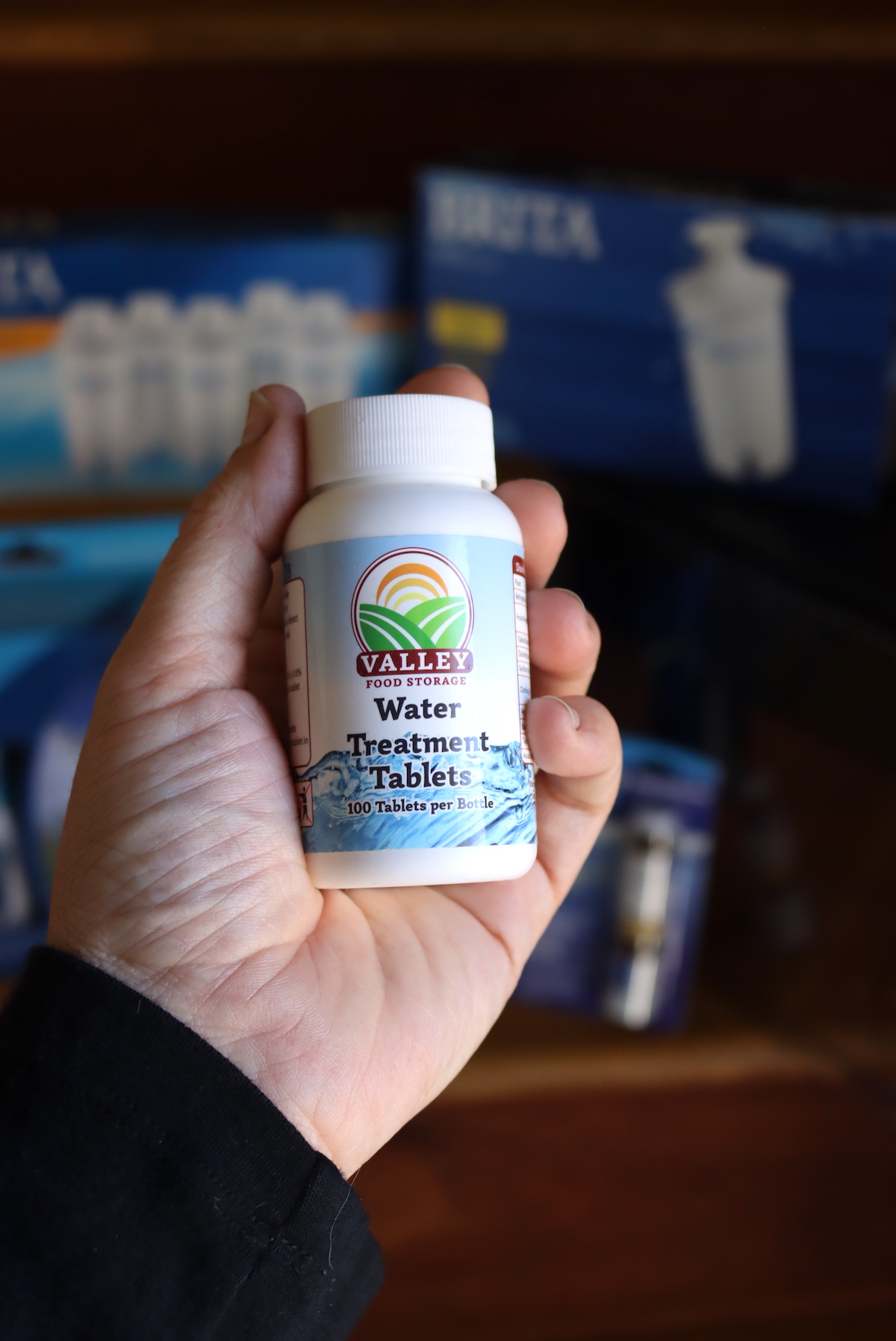
Best Emergency Water Treatment Options
So in review, I really do think the Berkey Water Filter is the best all-around option for at-home use. If you’re looking for a way to ensure your family has clean, potable water at home in an emergency, there’s no better option than a Berkey.
It works wonders to take contaminants out of city water (or well water) in non-emergency situations too.
They do have smaller portable versions, and many people take them with them on hotel trips. They’d be fine for car camping, but they’re not exactly designed for backpacking.
Life straw filter bottles work well for drinking water if you’re backpacking or need an extra light option. If you don’t need filtration, but you’re still needing purification (ie. you’ll have access to clean mountain streams, but just need to remove any biological contaminants), then consider either a UV wand (better tasting, less dependable) or potable aqua tabs (doesn’t taste great, but doesn’t require batteries).
Water storage is more important than filtration in arid locations without ready access to water. You can’t filter the water you don’t have.
In that case, the best option is to store water in 50-gallon drums and then use chlorine tabs to sterilize it when you need it. (Even if it goes in clean, it’ll go “off” over time and needs to be re-sanitized before use).
Besides 50-gallon drums, a bathtub emergency water bank also works, provided you have some advanced notice (hurricane, snowstorm, high winds knocking out power lines, etc). You can place the water bladder into your tub and fill it up if there’s a foreseeable emergency in the near future where you might lose access to running water.
It’ll keep the water clean, protected, and neatly contained in the tub (but not touching the tub sides that aren’t usually safe for clean water storage).
Finally, I’ll mention emergency water pouches as a good short-term option. They keep these on lifeboats, and they’re great to keep in your car. The pouches have clean water that’s rated for many years of storage, and it can survive heat or freezing (in a car trunk or lifeboat). They’re small pouches, but they’re perfect for getting you through for a few days until you can access more water or services are back.
Preparedness Resources
Looking for more preparedness resources?
- Best (and Worst) Emergency Food Suppliers
- How to Prepare for WWIII
- Survival Gardening: Our Real Life Dry Run
- Best MRE Meals (Meals Ready to Eat)
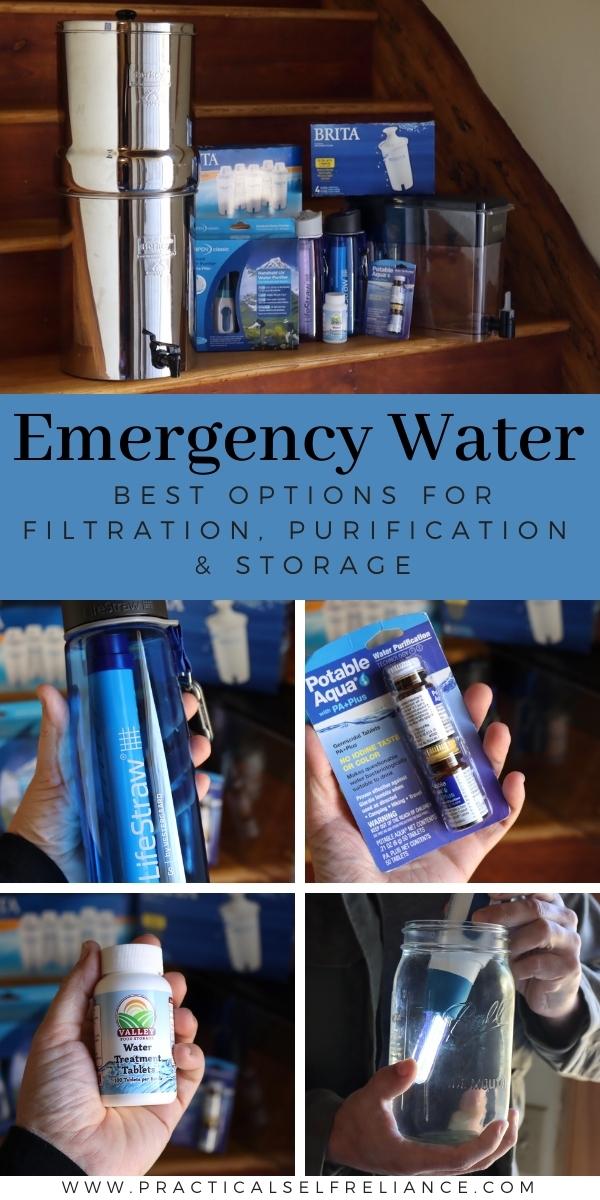
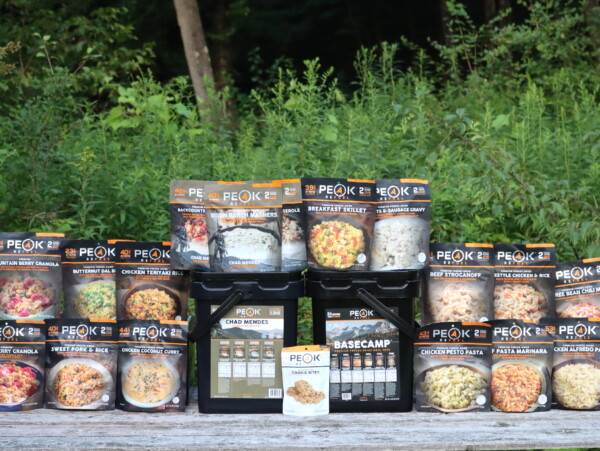
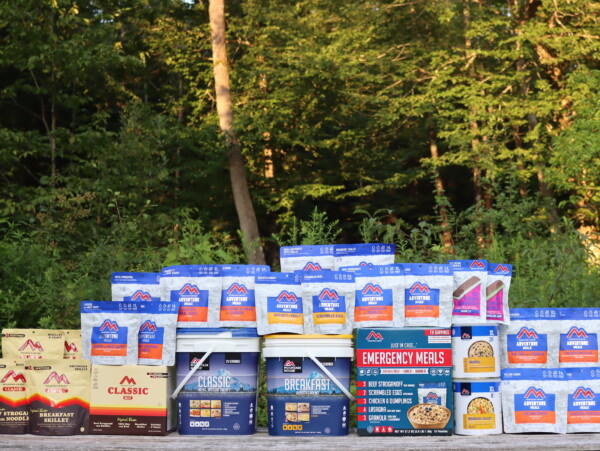
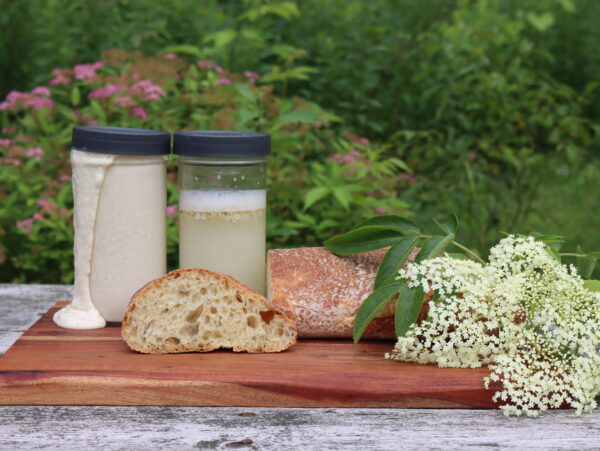
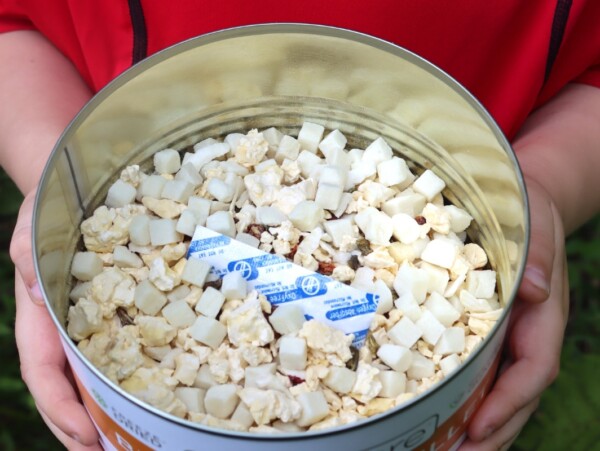
Thank you for this info. Super helpful as I am new to looking into water filters. Do you know if the Berkey you mention can make pool water safe for drinking?
Thanks!
Terry
A water filter such as the Berkey would definitely make to pool water safer to drink but I would avoid using the pool for drinking water if at all possible.
We have had a Royal Berkey for about 20 years now. Our last set of filters needed replacing and we checked around looking for replacement filters. We happened to see a video from a consumer who got curious about how effective Berkey filters really are. He noted that the last water quality testing for the Black Berkey filters were done around 15 years ago, and decided on his own to get his new filters tested. The filters could not meet the high performance of the outdated tests. It is stil pretty eawsy to find the videos this consumer posted. BTW the website you linked for Berkey products lists the replacement Black Berkey filters as “Out of Stock” Mike Adams recently tested the efficacy of a selection of filters for filtering cesium in his food safety lab. Tthe results he posted were of filters that were extremely effective to the 97 to 98 percentile, and a few that scored 99.97…% and higher.
I am very much impressed with your advice and summation of Emergency Water Filtration Options. We live next to a small lake and feel it may come in handy if a crises does come our way. Knowing how to have “clean” water for drinking is a high priority for us. Thank you for all your great ideas and reasons for what you printed.
I am a recent reader of your blog.
C from Iowa
Wonderful, so glad it’s helpful to you!